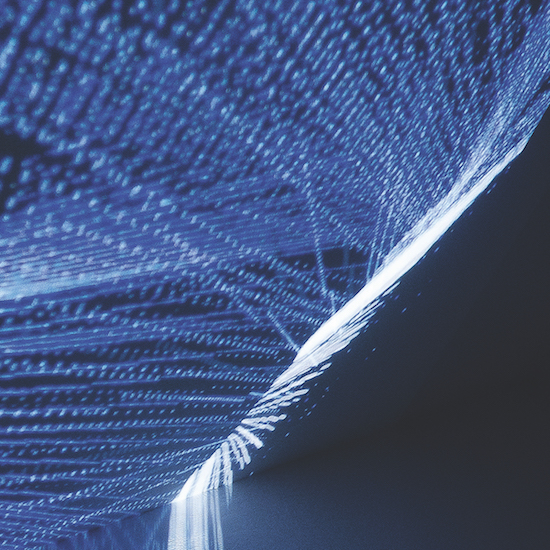It might help to know, when contemplating this remarkable album, that [Hi:Emotions] is a pseudonym of ScratchaDVA — former Rinse FM breakfast show host, Tinie Tempah tour DJ and Hyperdub mainstay. Then again, it might not, as DVA is one of those brilliantly unique figures in modern music who genuinely defies characterisation.
You might have him pegged as a grime producer, dubstep DJ or UK Funky don – and there are elements of all this in his work. But, as Scratcha said in an interview with Cargo back in 2012: “My music is always different all the time… When I go into the studio I don’t actually think about what I’m going to do… I just let it happen and I get stuck in moods or vibes.”
It’s an approach that has resulted in such wonderfully unlikely tunes as ‘Jelly Roll’ – UK Funky meets Super Mario World – and ‘Soundcheck’, which sounds like a drum kit falling down the stairs. Even by these standards, though, NOTU_URONLINEU is a distinctly odd proposition. The record is, apparently, a dystopian concept album with hints of “faux-therapeutic advertising and psychotic jingles” that reflect the stress of life online and was recorded entirely in the dark.
This is not, in other words, an album of straight-up club bangers or even a release that behaves like most other albums do. It starts, on ‘SHUTDOWNCENTRAL’, with half a bar of rhythm, followed by the sound of a machine in the throes of violent electronic death and ecstatic re-boot; and it ends, 40 minutes later, with 60 seconds of silence, the muffled throb of Rinse FM and an advert for Hi:Tunes, a new app that allows you to “create the sounds you’ve always dreamed of”. The album eventually cuts off dead in the middle of a Rinse station ident.
Perhaps the best point of comparison for what happens in the 40 minutes that separate these two points is jazz – a style of music that DVA has previously noted as an influence – not so much in the album’s sonic palette, which is composed largely of icy synth melodies and drum machines, but in the sense of musical freedom that permeates proceedings. NOTU_URONLINEU feels loose, improvised and off grid, a rarity in the quantised-to-within-an-inch-of-its-life world of electronic music. Machine rhythms fidget and stutter, pulled around on an improvisational whim, and idiosyncratic sonic effects pop out of the mix.
The result is hugely atmospheric, an album shot through with anxiety and distrust, framed by nervous vocal samples (“What’s wrong? I know something’s wrong”) and mock advertising jingles for products that don’t exist. The music on the album is both ever changing, with no two bars the same, and minimal, rarely using three sonic layers when two will suffice. ‘B IT’, for example, consists of little more than a crab-like drum pattern, which gets pushed and pulled by filters and effects, and cut up vocal samples. It is a remarkably quiet song, almost withdrawn. But the effect is to pull the listener in, demanding engagement, as you wonder where on earth it might go next. In the rare moments when a more conventional sound does emerge from the mix – the jazzy Rhodes chords which surface on the title track or the R&Bish vocal line from Rae Rae and Roses Gabor on ‘ALMOSTU’ – the effect is ecstatic, like stepping into a sun beam on a cold winter’s day.
Both tunes are highlights. But the album’s standout track has to be ‘DAFUQ’, with additional production from Sinjin Hawke. It stands as a rare moment of triumph and absolute certainty among the album’s spirit of apprehension, riding in on a wave of blockbuster brass like a slow-motion Hollywood hero before pivoting into an abstract grimy beat, the kind of thing you think you hear on pirate radio at 3am but never quite remember in the morning. It’s stirring, epic and weird, like Wiley remixing a Bond theme, and demands repeat listening.
In this ‘DAFUQ’ is typical of NOTU_URONLINEU: it is not an easy album, one whose charms are apparent via 30-second SoundCloud clips and skim listening. Rather, it demands re-plays and close attention. But it is a fascinating piece of work, one that seems to operate according to its own internal logic and the rest of the musical world be damned. It represents music as free expression, a kind of improv jazz for the electronically inclined or Autechre if they had grown up on Rinse FM. It’s a brilliant, confounding piece of work, in other words, although good luck finding its niche in your well-ordered record collection.


